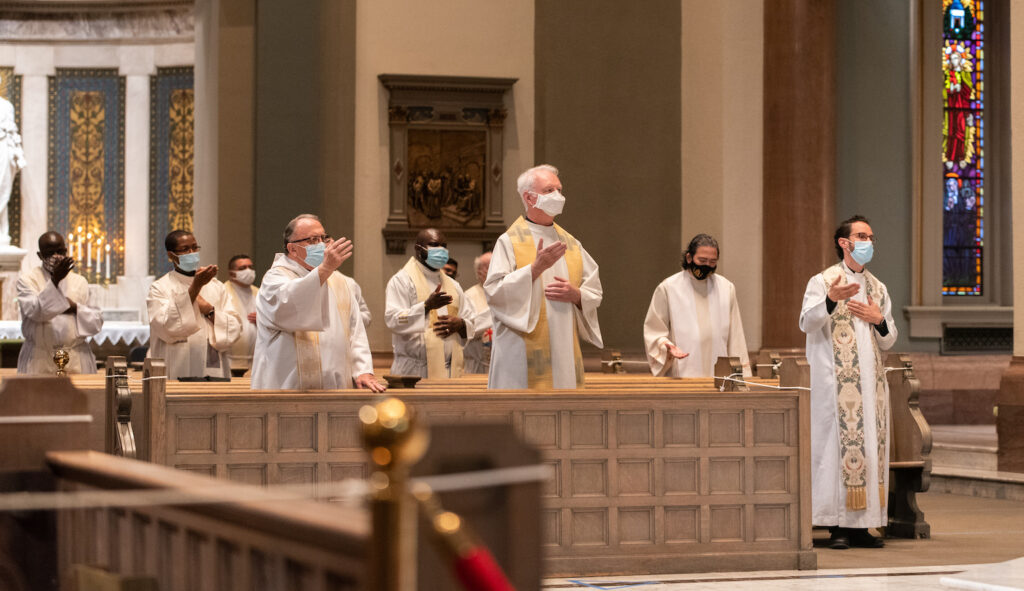This is a busy time in our diocese. Parishes are returning to full capacity for the celebration of Mass and resuming many of the activities that were put on hold during the pandemic. At the same time, some parishes are saying farewell to priests who will be going to new assignments on Monday, July 5, and preparing to welcome those who have been sent to serve them.
This can be a difficult time for the departing priest and the parishioners. During his time in a parish, the priest grows close to the faith community through celebration of the sacraments and responding to the pastoral needs of those he has been called to serve.
As the fathers of the Second Vatican Council wrote, “In carrying out their duties as pastors, parish priests should make it their special concern to know their parishioners. Since they are shepherds of all the individual sheep, they should endeavor to stimulate a growth of the Christian life in each one of the faithful, in families, in associations, especially those dedicated to the apostolate and, finally, in the parish as a whole” (“Bishops in the Church,” 30).
Because our priests are dedicated to their ministry and strive to fulfill this commitment, parishioners get to know them and to appreciate the spiritual leadership and direction they provide. Thus, when priests are given new assignments, the parting can be an emotional experience for all.
There are two important elements in the model for priesthood established by Christ. The first is the calling, which is always followed by sending them out to proclaim the reign of God and to heal the sick. In Matthew 10:1 (and Mark 6:7 and Luke 9:1), Jesus summoned the 12 apostles “and gave them authority over unclean spirits to drive them out and to cure every disease and illness.”
In John 1:35-51, Jesus calls together his first disciples. He asks some: “What are you looking for?” They answer: “Rabbi (which means teacher) where do you stay?” Jesus answers: “Come and see.”
In the millennia that have followed, bishops have called men to priestly formation. However, those coming forward already have what might best be described as an “interior stirring,” a sense and desire that they are being called, that they have a vocation to the priesthood.
Once a bishop calls a man to enter the seminary, that discernment continues during his formation — a process that develops the human, spiritual, intellectual and pastoral dimensions of his life.
The second element in Christ’s model for priesthood is the commissioning, the sending (Mt 10:5-15). Every priest knows that his vocation, as Pope Francis described it during the Mass in which he ordained nine priests on April 25, “is not a career, it is a service.” It is one in which he is sent where he is needed, where he can use his gifts to best serve the faith community.
When you read the stories about our priest jubilarians and our retired priests, you see all the places they have served — sometimes for a few years, other times for much longer. None were on a “career path.” More likely their path of pastoral service zig-zagged across the diocese.
This is particularly true of the international priests whose presence and service have been a blessing to our diocese. They were called to priesthood by their own bishops, sent here by them and then sent again by me in order to provide for the ongoing sacramental and pastoral care of our faithful. They, like all priests, are truly apostles, i.e., “one who is sent.”
In deciding where to assign priests, I receive input from the Priests’ Personnel Board and the deans to understand better both the needs of the priests and the needs of each parish. Ultimately, it is my responsibility to make sure the pastoral needs of a parish will be addressed by the priest who is assigned there.
Just as the document “Bishops in the Church” delineated the duties of parish priests, it also advised bishops what to consider when sending priests to parishes:
“In forming a judgment as to the suitability of a priest for governing a parish, the bishop should take into consideration not only his learning, but also his piety, his zeal for the apostolate and those other gifts and qualities which are necessary for the proper care of souls” (31).
During this time of transition for many of our priests and parishes, know of my gratitude for the generosity and dedication of all the priests serving here, as well as the great spirit among our Catholics in welcoming the priests who are being sent to their communities. Together, may you continue to grow closer to Christ and to each other.

